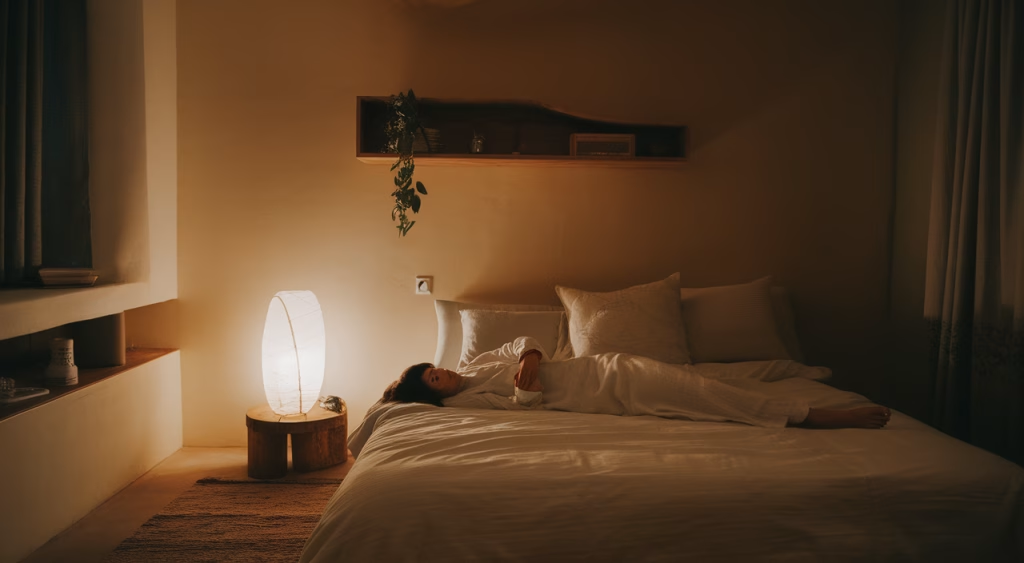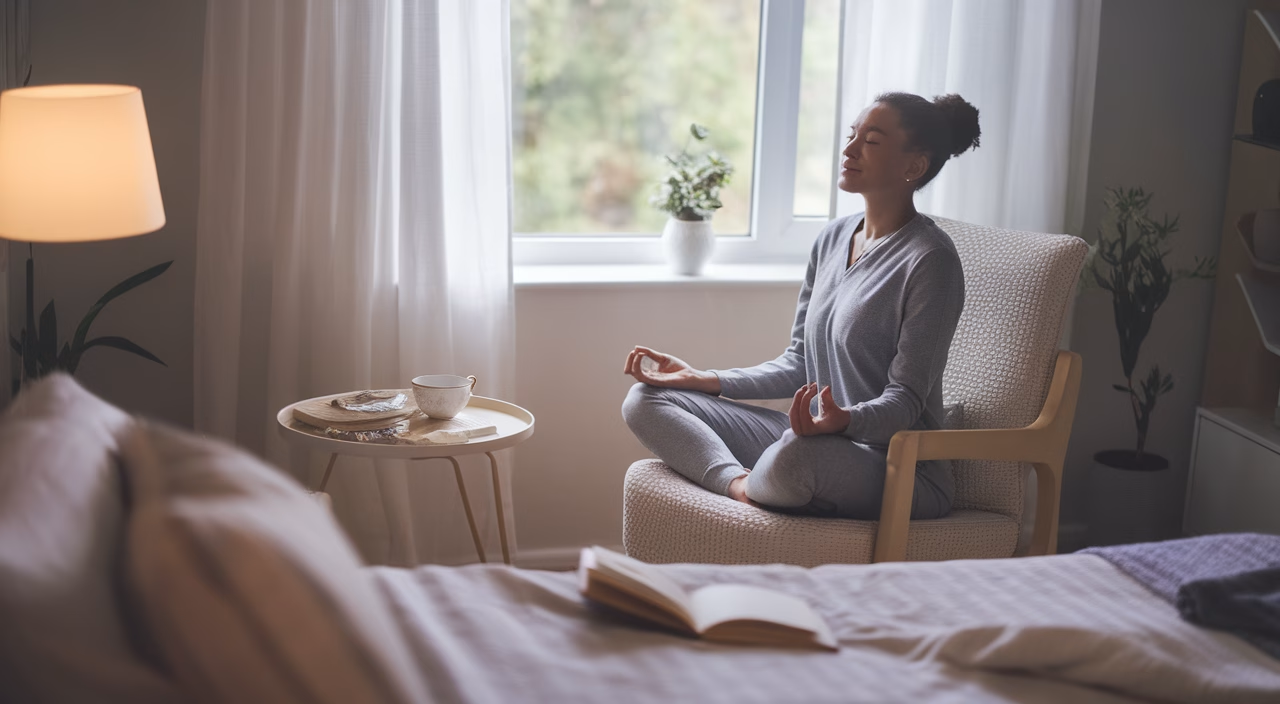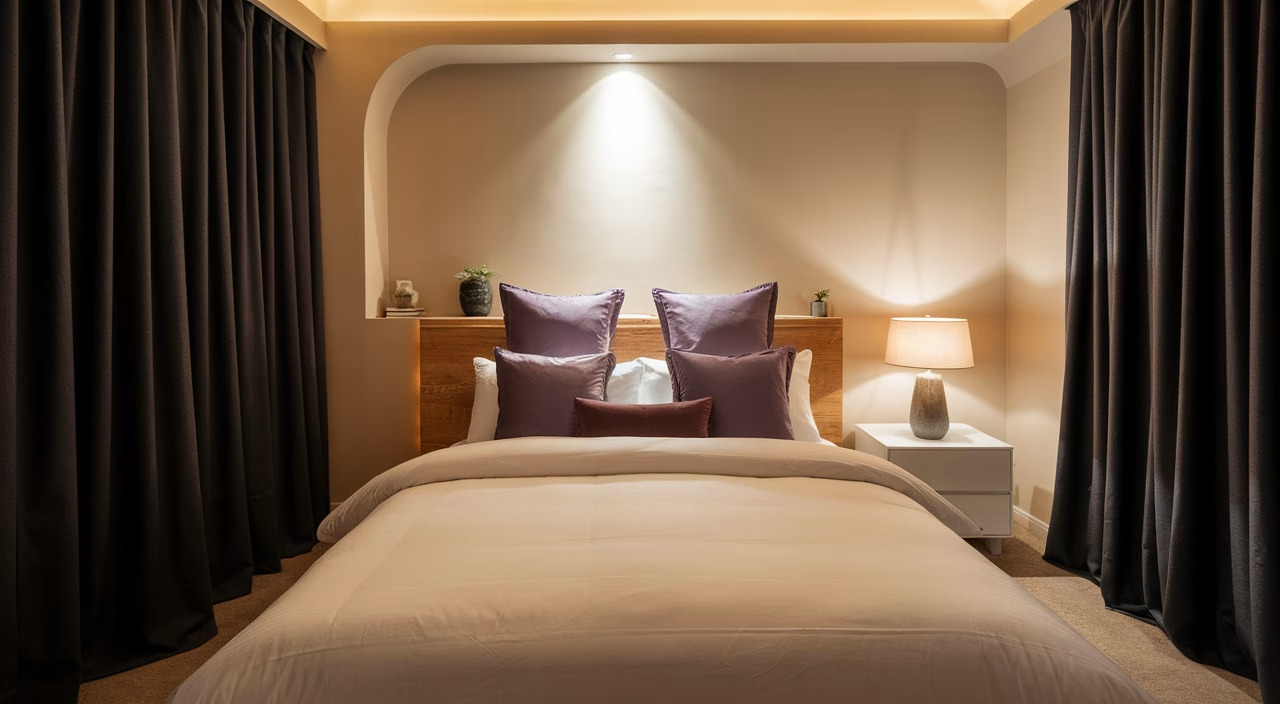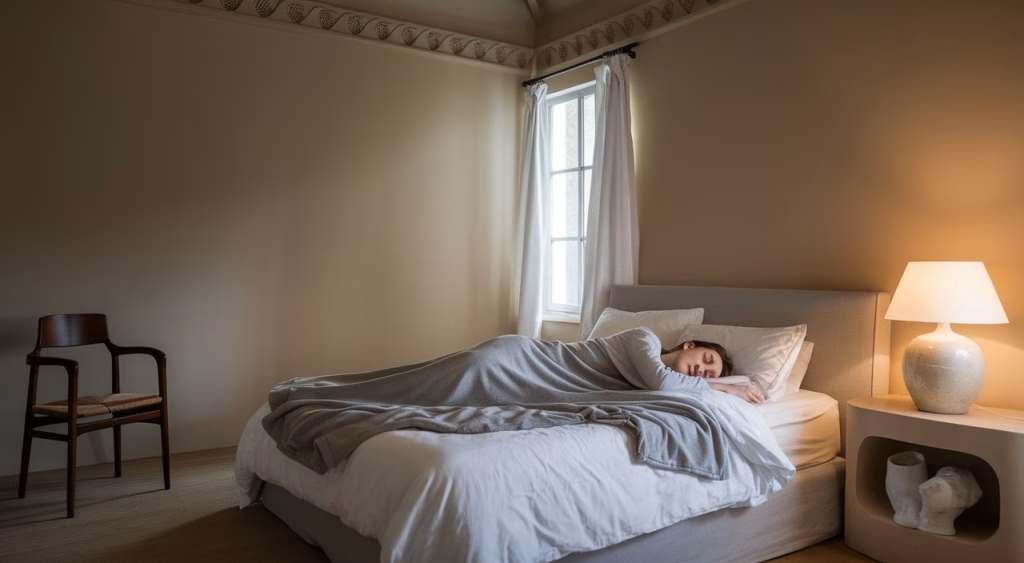How Can I Fix My Sleep Schedule Naturally?
Many people want to fix their sleep schedule but don’t know where to begin. Natural ways to reset your sleep routine involve consistent habits, optimizing your sleep environment, and addressing psychological patterns preventing rest. When you learn how to fix your sleep schedule naturally, you’ll discover it requires compassion, not force.
TL;DR — Summary
- Identify the root cause: Understand why your sleep is off — stress, shift work, screen time, or underlying disorders.
- Set a wind-down ritual: Start an evening routine with consistent activities, like dimming lights and journaling or light stretching.
- Use sunlight and nature: Natural morning light helps reset your circadian rhythm, syncing your body to a regular sleep-wake cycle.
- Mindfulness works: Simple mindfulness practices can help you fall asleep quickly by calming racing thoughts.
- Create a sleep-conducive environment: Cool, dark, quiet bedrooms help you stay asleep through the night.
- Know when to get help: If natural remedies for sleep schedule aren’t enough, therapy or sleep specialists can address more chronic issues.
Understanding Sleep Disruptions
If you’ve ever asked yourself why you’re wide awake at 2 a.m. but exhausted at noon, you’re likely dealing with a misaligned internal clock—also known as a disrupted circadian rhythm. Your body’s biological rhythms are designed to regulate temperature, digestion, hormone production, and, yes, sleep.
Common reasons your sleep schedule might be off include:
- Stress or anxiety: Racing thoughts or chronic worry can prevent the brain from winding down.
- Irregular bedtimes or screen time: Blue light suppresses melatonin, the sleep hormone.
- Shift work: Night shifts disorient the circadian clock.
- Jet lag or travel: Crossing time zones disrupts your body’s routine.
Each of these factors impacts your ability to fall asleep quickly and stay asleep through the night. Think of your sleep like a symphony—it requires the right timing, rhythm, and repetition to keep it playing in harmony.
Establishing a Bedtime Routine for Adults
Imagine trying to park a train going full speed—it needs time to slow down. Your mind operates the same way. You can’t expect to go from checking emails and watching Netflix to instantly falling asleep. Establishing a bedtime routine for adults is about consistency and signals. You train your mind to know: “This means it’s time to sleep.”
Here’s how to build one that helps you fix your sleep schedule:
- Set a consistent bedtime and wake time, even on weekends.
- Ditch screens at least 60 minutes before bed.
- Use calming rituals: try reading, taking a warm shower, mediating, or journaling.
- Lower the lights and reduce household noise after 8 PM.
In practice, you’ll notice your body begins to anticipate sleep as you start your nightly routine. Just like kids respond to bedtime stories and dim lights, so do adults — we’ve just forgotten the cues that help us reset our sleep routine.
Mindfulness Practices for Better Sleep
Your thoughts can either be your lullaby or your biggest sleep saboteur. If swirling worries or mental to-do lists keep you awake, mindfulness practices for better sleep might be the night-time anchor you need to fall asleep quickly.
- Body scans: Mentally check in with each body part to release tension.
- Breathing practices: Try the 4-7-8 method or box breathing to regulate your nervous system.
- Guided meditation: Sleep apps or audio meditations can gently transition your mind away from busy thoughts.
- Gratitude journaling: Listing three moments of joy can shift focus away from stress.
Around 15 minutes of mindfulness before bed helps your parasympathetic (rest-and-digest) system take over. Instead of fighting sleep, you float into it and stay asleep through the night more easily.
Creating a Sleep-Friendly Environment
Your bedroom isn’t just a room—it’s your sanctuary. Many people overlook environmental triggers that prevent good rest. If your bedroom is too bright, cluttered or noisy, your brain may stay in alert mode, making it harder to fix your sleep schedule naturally.
- Darkness: Use blackout curtains or eye masks to cue melatonin release.
- Sound: White noise or sleep sound machines promote uninterrupted rest.
- Temperature: Keep rooms between 60–67°F (15–19°C), the optimal sleep zone.
- Declutter: A messy room causes low-level stress—even at a subconscious level.
Cost Guide: Creating a Sleep Routine
| Item | Low-End | Mid-Range | High-End |
|---|---|---|---|
| Blackout Curtains | $15 | $40 | $100+ |
| Sound Machine/App | $0 (Free app) | $30 | $100+ |
| Mattress Upgrade | $200 | $800 | $2000+ |
| Mindfulness Tools | $0 | $10–$20 (Book/App) | $100+ (Courses) |
Seeking Professional Help
What if you’ve tried natural remedies for sleep schedule correction and still toss and turn? That’s where professional sleep guidance becomes essential. Persistent insomnia, night waking, or anxious sleep patterns may point to deeper disorders like sleep apnea, delayed sleep phase disorder, or chronic stress responses.
In my practice, I often see adults who “feel broken”—frustrated they can’t fix what should be automatic. But sleep challenges are highly individual. What works for one person may fail for another. That’s why therapy-based sleep methods (like Cognitive Behavioral Therapy for Insomnia or CBT-I) can be life-changing when learning how to fix your sleep schedule.
Ever wondered if medication should be your next step? While natural sleep aids and routines work for many, short-term medicinal support is sometimes necessary—but always under professional supervision.
Final Thoughts
Learning how to fix your sleep schedule doesn’t happen overnight—but neither did the disruption. With the right habits, environment, and kindness toward yourself, nights get easier. When you consistently apply these natural remedies for sleep schedule correction, you’ll find it becomes easier to fall asleep quickly and stay asleep through the night.
You deserve deep rest. Let your next bedtime be the first step toward balance and rejuvenation as you reset your sleep routine.
Frequently Asked Questions
- What is the fastest way to fix my sleep schedule?
Gradually adjust your bedtime by 15–30 minutes earlier each night and wake consistently at the same time. Include morning sunlight exposure and calming nighttime rituals to ease the transition. - Should I pull an all-nighter to reset my sleep?
No. Staying up through the night often backfires, leading to exhaustion and worsening insomnia. Instead, shift your schedule gradually with mindfulness and consistency. - Do naps affect resetting my sleep routine?
Yes. Napping too late or for long periods can prevent you from falling asleep at night. If needed, nap briefly (20–30 mins) before 2 p.m. - Can diet help me fall asleep quickly?
Certain foods rich in magnesium, tryptophan, and melatonin-producing compounds (like almonds, tart cherry juice, and oats) may support better sleep, especially when eaten a couple of hours before bed. - Is it possible to manage shift work sleep issues naturally?
Yes. Rigid routines, black-out conditions during day sleep, and melatonin supplements guided by a specialist can help. Light therapy and scheduled exposure to daylight support better alignment. - How long does it take to fix a disrupted sleep schedule?
For most people, it takes one to two weeks of consistent habits. However, if poor sleep stems from psychological causes, adjusting may take longer and require professional help. - What if natural methods don’t work?
If nothing improves after several weeks, it’s important to consider therapy or sleep disorder evaluations to rule out medical or psychological contributors.





